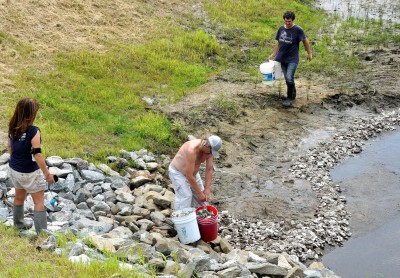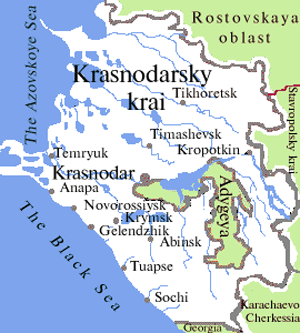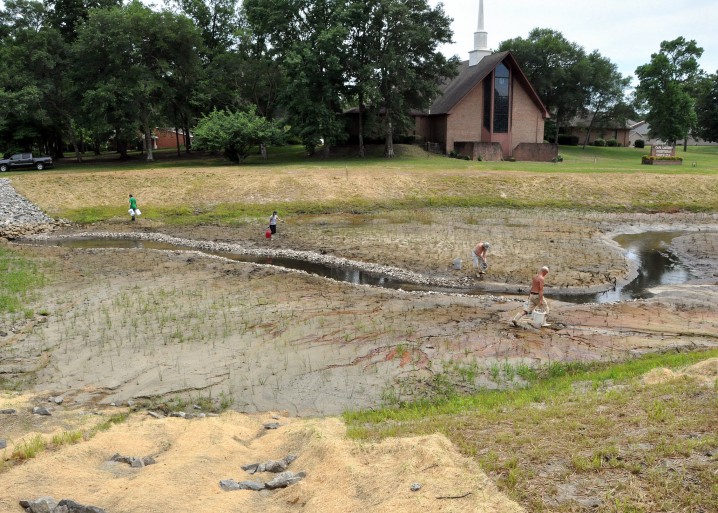This article is written by our friends from Coastal Review Online and highlights the exchange program we run in partnership with Environmental Watch on the North Caucasus. Original article is posted here.
 CAPE CARTERET — Two Russians stood in the bed of trailer filled with oyster shells, shoveling the shells into buckets. Others stood by, ready to carry the heavy buckets, two at a time, down the steep slope and through the mud to the newly restored salt marsh outside of Cape Carteret Presbyterian Church.
CAPE CARTERET — Two Russians stood in the bed of trailer filled with oyster shells, shoveling the shells into buckets. Others stood by, ready to carry the heavy buckets, two at a time, down the steep slope and through the mud to the newly restored salt marsh outside of Cape Carteret Presbyterian Church.
It was a typical June afternoon in this small community in western Carteret County: hot, humid, heavy clouds hanging in the air with the threat of rain — the type of afternoon that keeps local residents locked indoors with the air conditioning.
But the Russians, who are part of an environmental group called Environmental Watch on the North Caucasus, or EWNC, in Krasnodar Krai near the Black Sea, were undaunted by the heat, bringing down bucket after bucket of shells to the tidal creek until they had used all the shells in the trailer. As they worked, two took off their shirts to cool down and others rolled up their sleeves. But no one ever slowed down.
Lexia Weaver, a coastal scientist at the North Carolina Coastal Federation, looked at the trailer in surprise. It was about 3 p.m., and she suggested the group move some rocks over at the adjacent wetland and then return to the office. But the Russians weren’t quite ready to stop.
“They want to keep working. They’re ready to work until 5,” said Kate Watters, the translator for the group and executive director of Crude Accountability, an environmental organization in Alexandria, Virginia.
Federation staff and two of the Russians went back to the central office, collected the rest of the shells, and for the rest of the afternoon, they put down about 80 feet of shells for oyster habitat along both banks of the tidal creek.
During their visit to the federation offices in Carteret and Dare counties, the Russians worked on projects for more time than anyone asked of them. The day after the work at the church, for instance, they built oyster reefs for a living shoreline project at Trinity Center in Pine Knoll Shores. They put down more than 300 bags of oyster shells and expressed disappointment when they had to break for lunch.
Living under an authoritarian regime that does not trust environmental groups, EWNC members can’t do these types of large-scale projects. Coming to North Carolina and getting to participate is, as EWNC member Sasha Korovayny put it, “pretty cool.”
It’s hard to know exactly what the Russians’ real-time reactions to all the projects were because they spoke in Russian to each other — but the group chatted and laughed amongst themselves, and in an interview at the end of their week, they confirmed their enthusiasm.
“Everything is very different, beautiful places, beautiful architecture, people live in a completely different way, and I’ve been just stunned by the work of the organization,” said Korovayny. “The things that you guys have been able to accomplish are practically impossible to do in Russia.”
Evgenia Shinevskaya, an EWNC board member and special education teacher, said visiting North Carolina towns had convinced her that urban spaces can be “beautiful,” something she had only recently begun to realize in her small hometown, Primorsko-Akhtarsk.
“I understand now how a city can be beautiful with parks, with flowers, with trees, with all kinds of plantings,” she said.
In Primorsko-Akhtarsk, Shinevskaya said the government started cutting down all the trees, prompting her to reach out to EWNC. The group has begun addressing sustainability issues in urban development, and their involvement has made a difference in the way officials treat concerned residents.
 In Russia, she said, “papers” hold a lot of weight — if someone has ties to a group, he or she matters. And if not, that person is nobody. At first, local bureaucrats wouldn’t listen to her concerns.
In Russia, she said, “papers” hold a lot of weight — if someone has ties to a group, he or she matters. And if not, that person is nobody. At first, local bureaucrats wouldn’t listen to her concerns.
“But if you come in with a piece of paper that says you’re a member of Environmental Watch on the North Caucasus, which is an environmental organization and is demanding that you stop the cutting of trees, they relate to you in a whole different way,” Shinevskaya said.
She said she looked forward to the rain garden certification training in Wanchese, as this was one activity EWNC could use back home in urban spaces. Though they enjoyed the exposure to the work of an American environmental nonprofit, the scope of their work is limited.
Back home, activism comes with a price. Activists are often followed by police, and some EWNC members have faced jail time or been forced to seek political asylum. Corruption is Russia’s biggest environmental problem, said Aleksandr Biryvkof, an EWNC board member.
“The environmental problems we face are really nothing compared to the political problems we face,” he said.
Nongovernmental organizations face intense scrutiny from government officials, as they are one of the last groups that Russian President Vladmir Putin does not control.
“(Putin) has fully been able to control government structure and independent media. The last sphere that he’s not able to control thus far is civil society,” said Dmitry Shevchenko, deputy director of EWNC.
As a result, EWNC also considers itself a human rights organization.
“We’ve ended up spending a significant amount of our time defending the human rights of our local residents, fellow environmental activists and ourselves,” Shevchenko said.
EWNC is best known in the United States for its opposition to the Sochi Olympics, which destroyed thousands of acres of wetlands. One of its members, Yevgeny Vitishko, spent more than a year in prison for his opposition to the destruction. He was released in December 2015 but is still under house arrest.
“The construction of the Olympic site violated several articles in the Russian constitution, one of which is that every citizen has a right to a healthy and clean environment,” said Vladimir Kimaev, who lives in Sochi.
The Russian government passed many laws that excluded construction for the Olympics from environmental regulations, setting a precedent that has since allowed construction to start on a bridge across the Kerch Strait, which connects the Sea of Azov to the Black Sea.
“EWNC had been monitoring the project, saying it was bad. But there were no environmental impact statements,” Shevchenko said. “It sets the same precedent that the environment can be put on hold for certain projects.”

EWNC members and federation staff put down about 80 feet of oyster shells along the tidal creek to draw live oysters to the area. Photo by Todd Miller.
This is true for another element of EWNC’s work, which is monitoring second homes owned by government officials and the patriarch of the Russian Orthodox Church on the banks of the Black Sea. Shevchenko said the homes are built in areas with old-growth trees, rare trees and endangered species. Putin’s ski lodge is located in a World Heritage Site.
This monitoring causes backlash — two of their colleagues were imprisoned for protesting fence building in these areas.
“According to the law, these areas should be public domain,” Shevchenko said. “Instead, they’ve been closed off for these summer homes.”
Shevchenko did note, however, that EWNC has a nuanced relationship with federal, regional and local governments, and who their allies are depends on the issue. Pressure also sometimes comes from businesses.
“It’s not like we can’t get anything done and that they block us at every point,” he said. “Like for example, if we’re trying to create a protected territory, our allies on the governmental side are going to be those who are working on the national level.”
But cooperating is difficult, as the group has learned through trying to protect two wetlands in Krasnodar Krai that have Ramsar designation, an international recognition of environmentally valuable wetlands. Because the designation language doesn’t require that sites are also protected under federal law, many wetlands in Russia have fallen into a state of almost complete disrepair.
But recently, the regional government helped fund an environmental assessment of the two wetlands. By the end of 2016, the government is expected to agree to help protect the area — a huge environmental win for EWNC. The public, however, is still not on board with the new regulations.
“There’s skepticism. There’s a ‘How could it be that you’re coming in here to make things better, there has to be another reason that you’re here, what’s your endgame?’ type of attitude,” he said.
Cooperation can be difficult in the U.S., but not nearly to the same extent. For example, the wetland restoration project at the ponds in Cape Carteret, which took the federation and partnering groups years to finalize, would be much more difficult in Russia. Something as simple as spreading oyster shells on the banks of a tidal creek was only possible after years of listening, planning and discussing — and EWNC members say they hope to have community and government cooperation to one day complete similar restoration projects in Krasnodar Krai.
“We feel as an organization our main job is to attract the public to our work so that people understand the importance of what we’re doing and want to be a part of it,” Shevchenko said. “It impacts them, not just the natural world — it involves us.”
